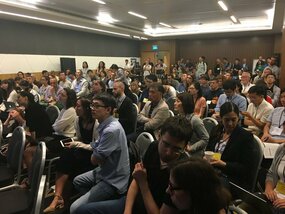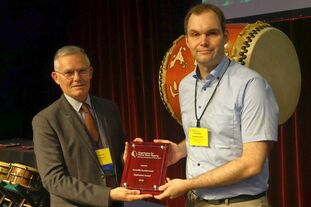|
By Tim van Mourik; Edited by Elizabeth DuPre The abstract reviews are in, and we're getting excited for OHBM's 25th annual meeting. Tim van Mourik has been chatting with Cameron Craddock about the history of the Open Science Room. Here he shares that history, his vision for Rome 2019, and asks for your priorities and interests via this survey.  Standing room only at the OHBM2018 Open Science Room Standing room only at the OHBM2018 Open Science Room As a member of the Special Interest Group on Open Science, I will be chairing the OHBM Open Science Room (OSR) this year. This is a room in which, during the main OHBM conference, topics related to open science are being discussed. The way I like to see it is that the main OHBM conference primarily focuses on the results of our scientific work, whereas the OSR is a place where we can focus on the process of doing science. In addition, it is a place for community discussion. Only last month a preprint on time-varying functional connectivity came out that had its roots in the OSR. After a Twitter conversation during the conference in Vancouver, the discussion was quickly moved to the OSR and eventually resulted in a collaborative manuscript.
0 Comments
Invitation to projectNatalia Bielczyk & OHBM Student and Postdoc Special Interest Group,
Edited by AmanPreet Badhwar Early career researchers in different parts of the world face similar challenges, but not everyone has the same access to mentoring and career development resources. While online mentoring programmes, such as the OHBM International Online Mentoring Programme, are available, it is hard to cover the needs of the whole population of early career researchers in the natural sciences. In order to tackle this issue within the OHBM Student and Postdoc Special Interest Group, we are developing a set of advice relevant to early career researchers in the natural sciences. The aim of this project is to empower early career researchers to positively influence their future career opportunities on a daily basis - regardless of the circumstances. The main points which we aim to cover are the following:
By Ilona Lipp and Jean Chen
Edited by: Nils Muhlert In science, the term “work-life balance” may seem like a holy grail for some and a conundrum for others. Its easy matter-of-factness belies deep self-examination. Today’s research communities are larger and more competitive than ever with regard to permanent positions and funding, with the success rate for many grants being as low as 5%. For this reason many leave academia after finishing their PhDs (according to a recent report by the Royal Society). For those who choose to stay, the clock starts ticking from the very moment one starts a job, and the counting begins --- for grants, for journal articles, for trainees, for experience in international labs, etc. So who are the people that, despite everything seemingly being against the odds, persevere and manage to stand out in a world of stressed early-career researchers? Do they purposely dedicate their lives to science? Do they have a life outside of work? Are they even human? To find out, we talked to a diverse group of seven early-to-mid-career researchers, all highly successful for their career stage in terms of their funding situation, publication list and professional recognition (below, ordered by first name). We asked them how important work-life balance is to them and what strategies they take to achieve it, and have summarized their answers for you. By Chris Gorgolewski & Ekaterina Dobryakova Reproducibility and transparency are core to all branches of science. Two years ago, OHBM established the Reproducibility Award. The purpose of this award is to honor researchers who conducted a ‘successful’ or ‘unsuccessful’ replication study, while adhering to rigorous standards of study design, data collection and analysis. The second recipient of the Reproducibility Award is Benedikt Sundermann, who received the award during OHBM 2018 in Singapore for his study that was published in the Journal of Neural Transmission. Chris Gorgolewski, one of the initiators of the OHBM Reproducibility Award, interviewed Benedikt about his experience related to this replication study.  Benedikt Sundermann (right) receiving the 2018 OHBM Replication Award from Professor Bernard Mazoyer (2018 OHBM Chair) Benedikt Sundermann (right) receiving the 2018 OHBM Replication Award from Professor Bernard Mazoyer (2018 OHBM Chair) Chris Gorgolewski (CG): I am joined here today by Benedikt Sundermann, the recipient of 2018 OHBM Replication Award. Benedikt, thank you for joining us and congratulations on the award. Benedikt Sundermann (BS): Thank you. CG: The first question I want to ask you is how would you describe the study if you met a stranger a bar? BS: In previous studies, people have tried to apply artificial intelligence technologies that are frequently used in face recognition to functional brain imaging data in order to try and diagnose people, for example, with depression. In our study, we wanted to see whether this replicates in a larger and more clinically realistic sample, featuring various comorbidities, heterogeneous age, sex etc. Surprisingly, most of the previously reported results did not replicate in this larger, more heterogeneous and clinically realistic sample. Only when we looked at a subgroup of people could we replicate some models but, still, at a diagnostic accuracy that would not be clinically useful. |
BLOG HOME
Archives
January 2024
|
 RSS Feed
RSS Feed